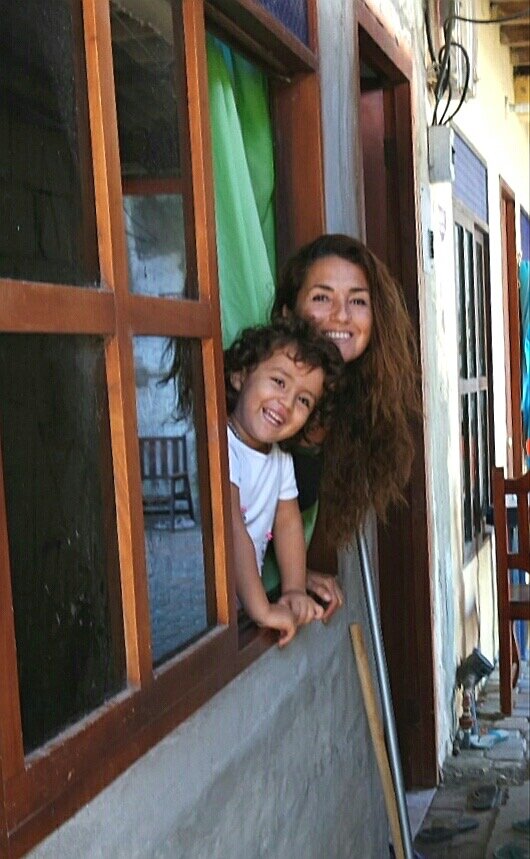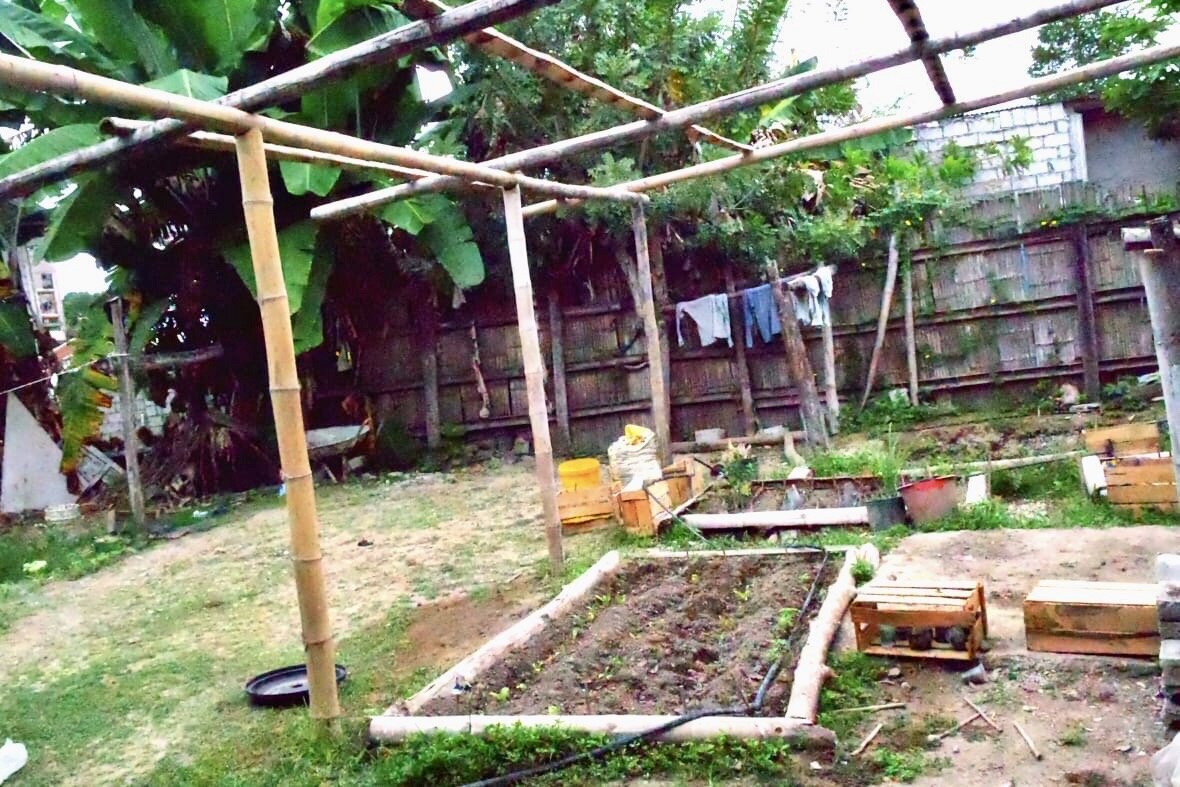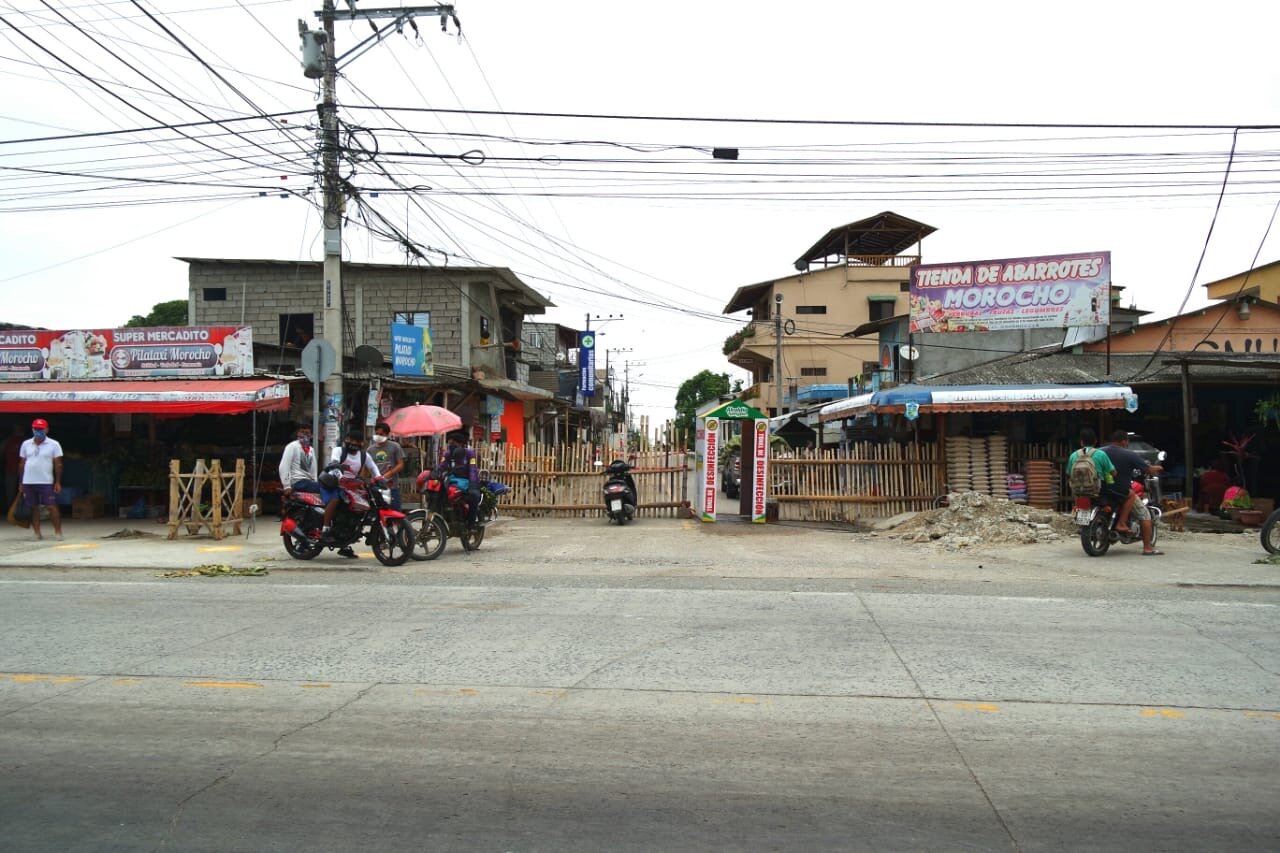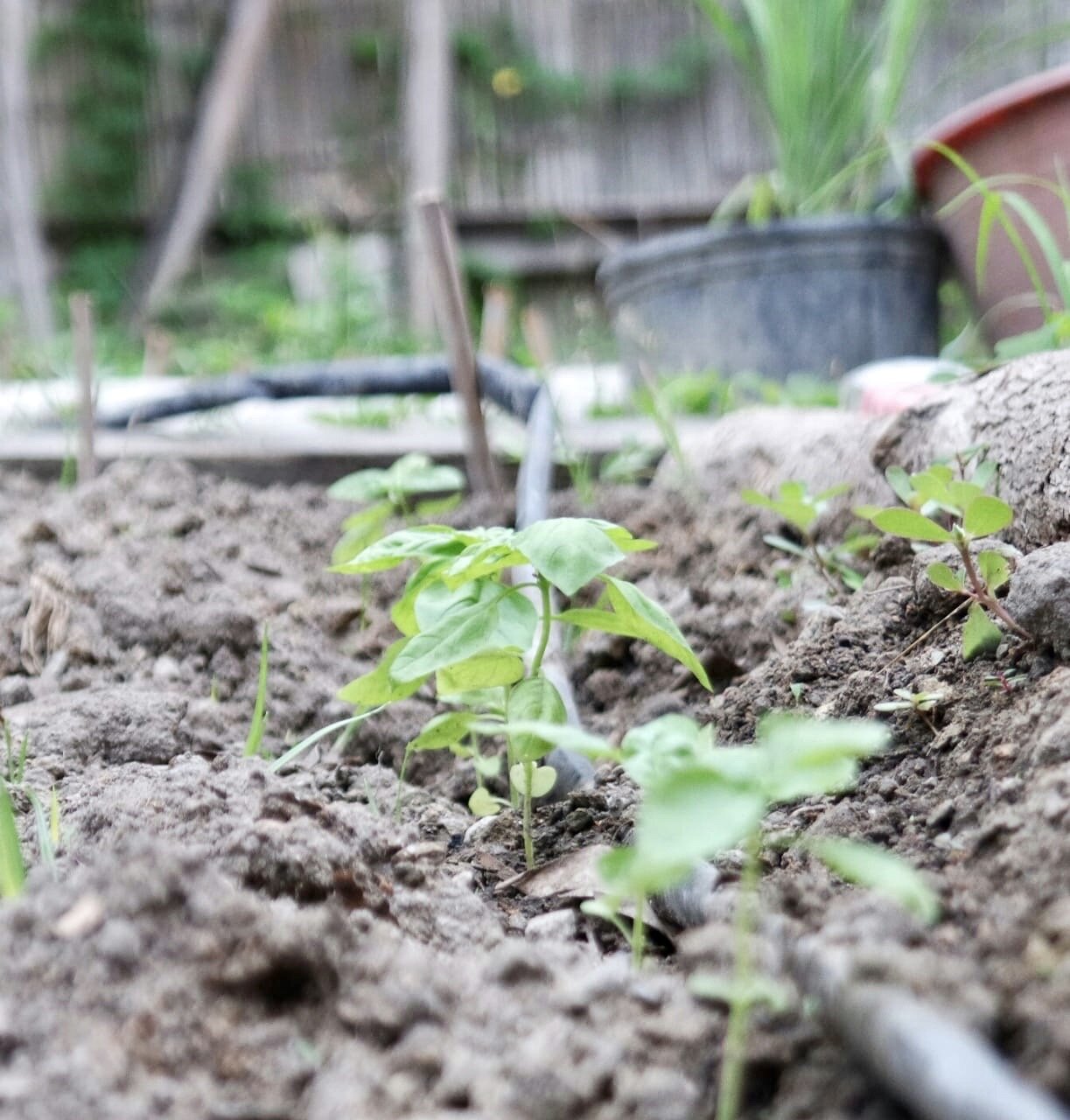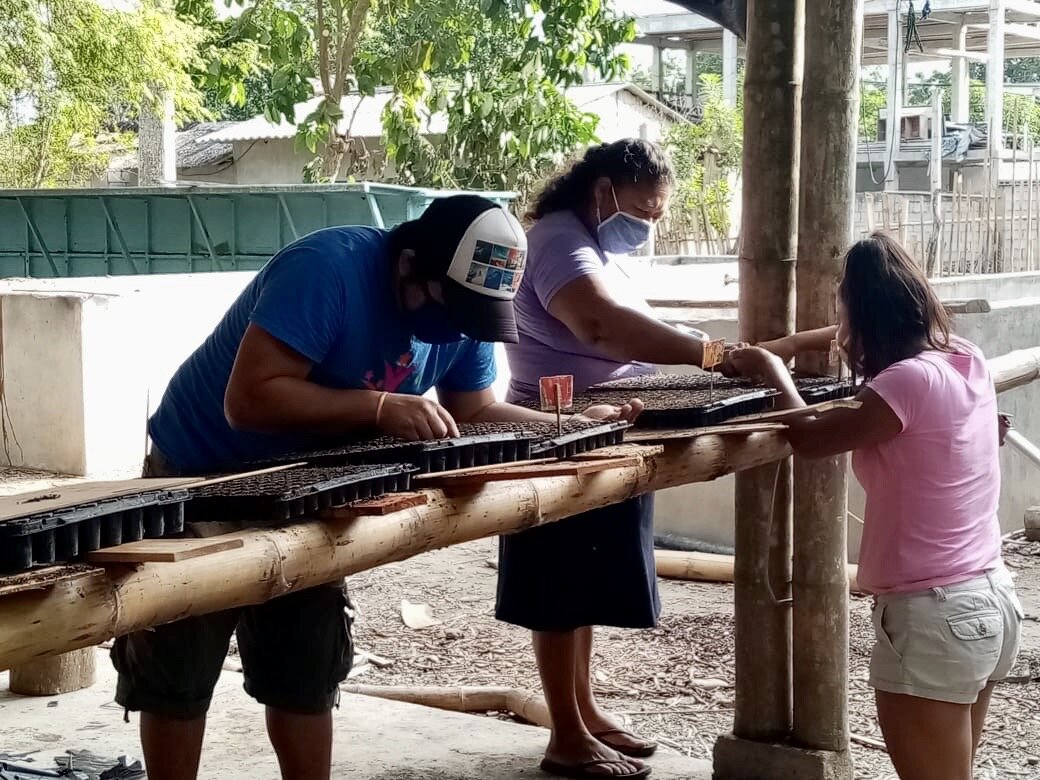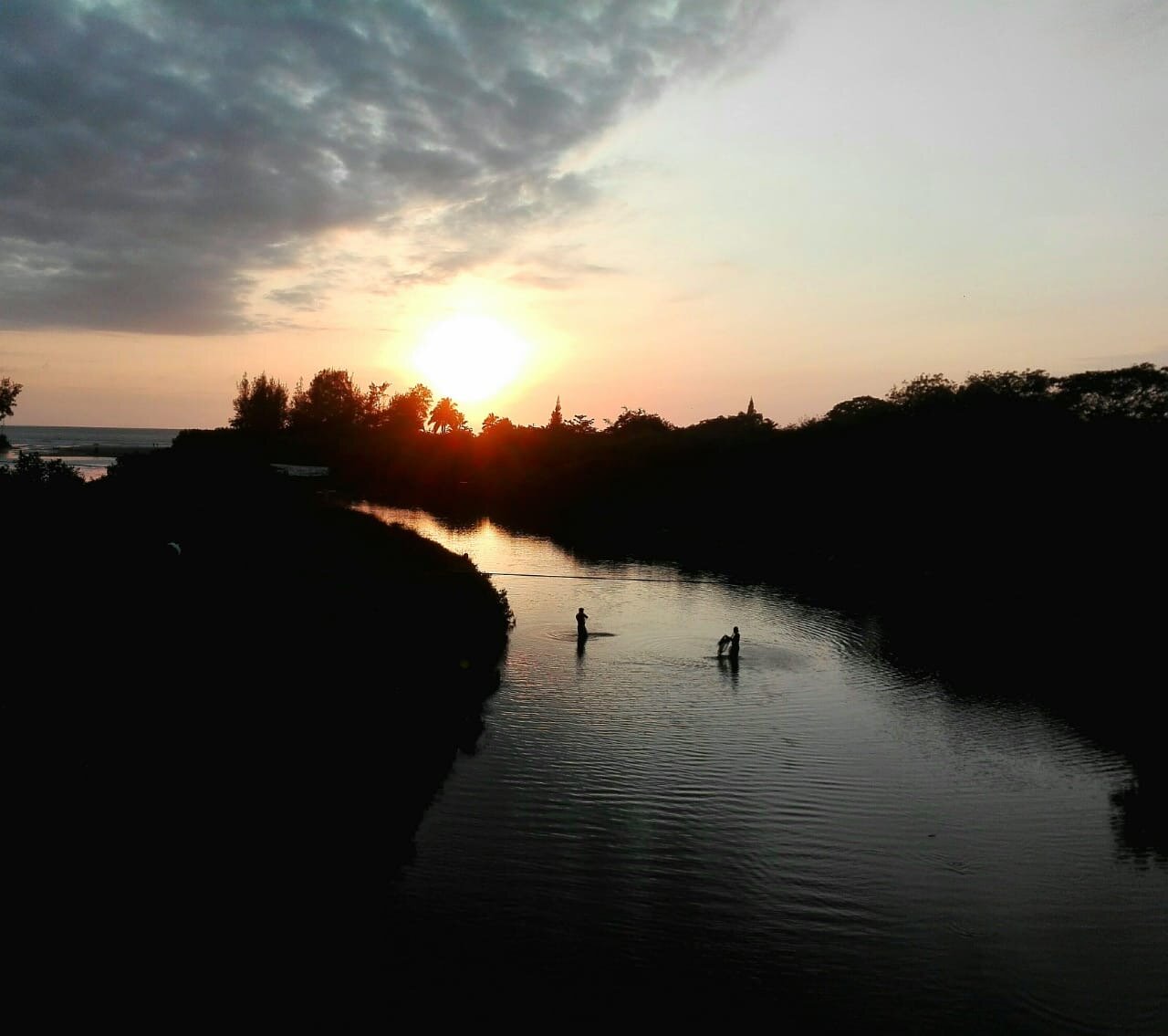Olón, Ecuador
Bárbara Mejías, 41, graphic designer, with her daughter Ámbar, 3
What do you see when you look out of the window?
My baby plants and the birds that are hungry for the seedlings. I planted the vegetable-beds shortly after the lockdown began, now I am yearning for the day when I can harvest basil, tomatoes, onions, radish, corn, beans, watermelons and pineapples.
What did you have for breakfast today?
Scrambled eggs, salty cookies and ginger tea.
What has become your most important object?
My phone. And then my camera. I use it to document the growth of my plants.
What do you miss the most?
The beach. All access is currently blocked.
According to the Ecuadorian Ministry of Health, on the 25th of May 2020 there have been 37355 confirmed infections and 3203 deaths due to the Corona virus in the Andean country, the number of unreported infections and deaths however, is estimated to be much higher. For weeks, Ecuador has been considered the epicentre of the pandemic in South America. In many cities people have found themselves caught in apocalyptic conditions, above all in Guayaquil, where corpses piled up on the streets as the funeral parlours couldn’t keep up with the cremation of the dead. Many families were even forced to bury their loved ones in cardboard coffins. In addition to the human suffering, the consequences of the pandemic in combination with the massive drop in oil prices have exacerbated the economic hardship that Ecuador already struggled with before the virus broke out. The country has lost over twelve billion US dollars, around fifty percent of its gross national income. Ecuador is suffering a crisis worse than “all the wars and natural disasters put together that the country has suffered throughout its history”, President Lenín Moreno said in a television address in April that was quoted in the “Financial Times”.
““We find ourselves thrown into a time that forces us to reconsider our way of life””
But the pandemic hasn’t hit all cities equally hard. There are places that only have been slightly touched by the virus, at least until now. One of them is Olón, a coastal town with around 2000 inhabitants, just around three hours by bus off Guayaquil. Here supposedly only around 12 people have died of Covid-19. Nevertheless there is a curfew as in all the other cities of the country, the beaches are closed and so are most of the shops, public transportation is laid down. "We find ourselves thrown into a time that forces us to reconsider our way of life," says Bárbara Mejías. Being originally from Chile, she has lived in Olón for seven years. When visiting the small town during a trip she fell in love with its people and the laid back way of life - and stayed. Bárbara has a three-year-old daughter and works as graphic designer for a foundation that promotes sustainable community based tourism projects in Ecuador, Peru and Colombia.
We meet each other via Skype. In Zurich it has just turned 5 pm, in Olón it’s 10 am:
Good morning, where do I catch you right now?
Bárbara Mejías: On my balcony (she laughs). I am enjoying the fresh morning air while keeping an eye on Ámbar. She is still asleep.
What’s the first thing you do in the morning?
I look at my baby and then at my baby plants. I lean out the window and ask them: "How are you doing today, baby plants?" After breakfast, if necessary, I go to town to buy groceries. Usually it's around 10 o’ clock then. I have to hurry as we have a curfew from two in the afternoon until five in the morning.
Streets in Olón. Here are some of the local food stores located.
I know lots of people who struggle with this “empty time” as they call it. How big a struggle is it for you?
None at all. I always have a lot of work to do. And then my baby and my plants keep me busy. And by the way, I’m not at all lonely here. I rent a room in the house of a family with four children, they have become like a family to my daughter and me. We cook and eat together, and Ámbar plays with the younger children in the garden. My partner is currently stuck in Colombia, so we have kind of a long-distance relationship right now. But that isn’t a problem. We are used to live apart from each other.
You told me that you planted the vegetable-beds just after the lockdown started. Why that?
The pandemic carries strong messages of death and disease. In the face of this I gain courage and strength from connecting with the soil and its plants and to watch them grow. It’s a way to survive in the pandemic and to keep myself from getting lost. By the way, I will soon have enough basil to make pesto. I am ready to eat a lot of spaghetti (she laughs).
Basil seedlings in Bárbara’s garden.
But spaghetti you loved already before the pandemic, right?
Yes, I could live off pasta.
In how far has the pandemic changed you?
I think it has taught me to connect with the knowledge of my ancestors: Growing food, using medical plants, living in a community. This is such important knowledge, a knowledge that is deeply rooted in human existence. But in the heat of our former rapid lives we forgot it. It’s not that I didn’t know about it before, in fact I think we are all aware of it. But the pandemic has given us the chance to revive that knowledge. Moreover - this time of confinement, that has forced people all around the world to reduce their speed and range of movement, has shown me that we can’t control nature. That we humans are just one of many species that inhabit this great being we call Earth. In fact there have been moments where I have even felt ashamed of us humans - I felt as if we were fleas, believing that we can dominate the dog. That has been a great lesson in humility for me. This I am deeply grateful for.
It seems as if you found a new rhythm of life.
That’s right. I spend more time with what is really important to me. Without any fear or anxiety, living solely in the present, filled with the absolute conviction that together we can build a different and better life for everyone. With new economic and educational models that truly allow us to live in harmony with Earth, nature and with ourselves.
What new economic and educational models do you have in mind?
I am a member of a group that cultivates and manages community vegetable-gardens in our city. Our project is called "Sembrando Viviremos", sowing we will live. Ecuador is in a serious financial crisis and it will get worse after the pandemic. Too many people live in precarious conditions. So, let us take precautions. Our goal is that in the future every family in Olón has its own vegetable-slot. Nobody should go hungry here.
Members of the group “Sembrando Viviremos” working on community vegetable-beds.
What makes society in Olón special?
Its strong sense of community. Everybody cares for each other. For example, when our neighbour fell ill with Covid-19, we all looked after him, brought him food and medicine.
Weren't you afraid of getting infected?
No, not at all.
What moves you over and over again?
The amount of solidarity I experience. We have a large group of expats here, most of them Americans. They collect money and food that is distributed by local foundations, authorities and many volunteers to all families in our town. They have even left a package with fruit, fish and a bag of detergent in front of my door, although I actually have everything I need. Recently, local fishermen even donated a truckload of fresh fish. People here have quickly accepted the new circumstances. I would even say: They are relaxed. I hope we can keep it up that way as many are afraid that now, that the restrictions are being eased a bit, people from Guayaquil will come here and spread the virus.
People in Olón are very religious. How do they deal with the fact that the churches are closed?
Well, the priests have found a solution: They preach over loudspeakers. Every morning, noon and evening the city is inundated with their preachings and their sermons seem to take forever. You know, we have quite a few churches here. I guess these loudspeaker sermons are welcomed by most of the people in Olón, but for me they are difficult to get used to as I'm not religious at all. I always cover my ears.
What plans do you have to postpone because of the lockdown?
My plans ... well, my family and I are nomads, so we don't usually make a lot of plans. And as I personally try to live and flow with life, I plan almost nothing. The only thing I did have in mind was to visit my family and friends in Chile, but there the authorities have been very bad administrators of the pandemic. They have put money above people's lives. Because of that, my country is experiencing a zombie apocalypse, which unfortunately will extend the crisis for several months to come and at high costs. All I can do is to send my family and friends all my love and ask them to take good care of themselves - and I have to wait patiently until I can hug and kiss them again.
Sunset over the river of Olón.
All pictures by Bárbara Mejías
Translation: Helene Aecherli

